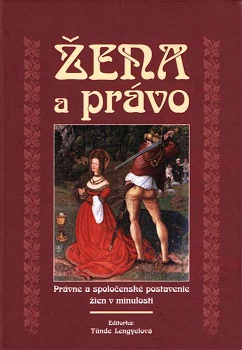Cudzinky v úlohe manželiek uhorských veľmožov v 16.-17. storočí
Foreign Wives of Hungarian Aristocrats in the 16 -17th Centuries
Author(s): András Koltai
Subject(s): Gender Studies, Modern Age, Culture and social structure , Family and social welfare, 16th Century, 17th Century
Published by: Historický ústav SAV
Keywords: Hungary; aristocracy; aristocratic houses; women; foreign wives; 16th century; 17th century;
Summary/Abstract: Hungarian aristocracy had universally adopted a critical attitude towards "foreign nations" in the 17th century. Nevertheless/ Hungarian aristocrats could not, but also did not want to prevent poli¬tical, business and even marital relations with the aristocracy from other countries of the Hab¬sburg monarchy altogether. It is necessary to know marriage strategy of Hungarian aristocracy to be able to understand the position of their foreign wives, in this respect, a note written by Friedrich von Teuffenbach is rather enlightening. He summed up his ideas about his future wife into ten points, out of which only the first one - that the girl should be pretty - was connected directly to the girl herself. The other nine were related to social and economic advantages expected to be gained by marrying her. On the one hand, beauty was not always a prerequisite of a marriage, but on the other hand, it was not enough that a girl came from a rich and prominent family. By proper behaviour and con¬duct, she was expected to represent her family in the new home in a respectable way and thus contribute to the authority of her husband. It was only after the ascent of the Habsburgs to the Hungarian throne that the Hungarian elite started to realise the importance, advantages and consequences of foreign marriages. The country got under the common rule with the Czech kingdom and neighbouring Austrian lands. Hungarian aristocrats had to share high offices with the Austrian and Czech nobility and they were further disadvantaged by the fact that the royal court and central offices were permanently outside the territory of Hungary. That was the reason why only few aristocratic houses from Hungary joined "royal court aristocracy”. Court aristocracy held the most prominent court and governmental positions and at the same time, multiple family ties interconnected their members, if one of the Hungarian families succeeded in penetrating into these circles, it could have positive effect on future carriers of their members. Nevertheless, apart from the Pálffys, only few noblemen succeeded in becoming established members of the court aristocracy. None of them improved his career by marrying foreign wife in any significant way. In the 17th century, the estates tried to preserve their national and traditional characteristics. However, towards the end of the 17th century it was becoming more and more obvious that the future of Hungary was the Habsburg monarchy and its common aristocracy. After the liberation from the Ottoman occupation, many foreign noble houses were donated esta¬tes in Hungary. By the late eighties of the 17th century, mixing of Hungarian nobility with court aristocracy and marrying foreign women had become commonplace. Foreign marriages of Transylvanian princes form a special category from several diverse rea¬sons. These marriages were first of all of crucial importance for the foreign policy and therefore brides came from the most prominent aristocratic houses. Foreign wives did not only bring the higher prestige and new useful connections, but also their own customs and numerous entourages. It would seem that the trickiest question would be a common language for communication, but in fact, it was not such a big problem. Actually, Hun¬garian aristocrats usually knew German or Italian languages and some of the foreign brides understood Latin. Only occasionally would a husband need an interpreter for talking to his wife. As for the dresses, there was not much difference in comparison with Hungarian women. What affected the lives of foreign wives most, were usually cultural differences and alien traditi¬ons. Many of them adjusted to the Hungarian lifestyle only with difficulties and tried to preserve their usual habits. They longed for the security of their old home especially in difficult situations such as labour or after the deaths of their husbands. Because their position as widows was not particularly desirable, many of them decided to return to their homeland. Fates of foreign wives throw some light on aims, options and boundaries of the Hungarian or central European aris¬tocracy in the early modern period.
Book: Žena a právo. Právne a spoločenské postavenie žien v minulosti
- Page Range: 185-195
- Page Count: 11
- Publication Year: 2004
- Language: Slovak
- Content File-PDF

